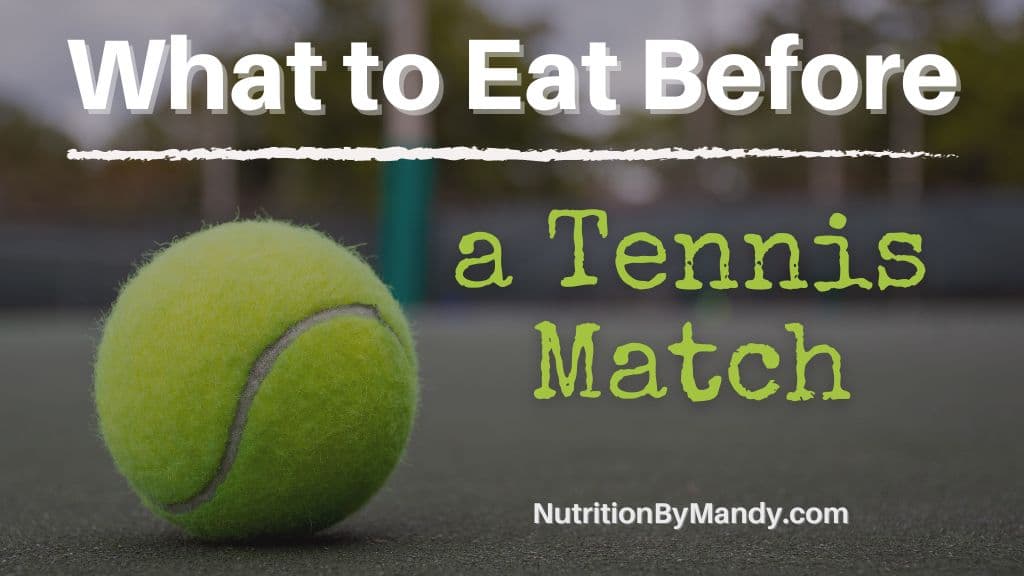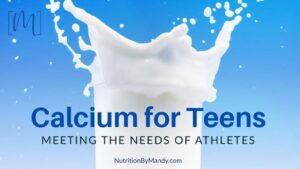Last Updated on January 6, 2025 by Mandy Tyler, M.Ed., RD, CSSD, LD
What to Eat Before a Tennis Match
It is important for athletes to know what to eat before a tennis match to fuel their bodies for optimal performance.
Let’s take a look at the energy requirements of tennis. Then we will explore recommendations for the best pre-game meals and snacks to provide tennis players with energy on the court.
Energy Demands of Tennis
Tennis is a sport that requires both explosive movements as well as aerobic endurance. Matches may last for several hours and include hundreds of movements and changes in direction (1, 2).
To excel on the court, tennis players must have speed, agility, power, and endurance (1). In addition, tennis players must be prepared to compete in a variety of weather conditions, including in hot and humid environments (1).
Based on the energy demands of the sport, having a plan for what to eat before a tennis match is key to supporting optimal performance on the court.
What to Eat Before a Tennis Match: Meal Timing
When determining what to eat before a tennis match it is important to consider the amount of time you have until the start of the competition.
Eating too much food, too close to the start of the match, may lead to GI distress during the activity (3).
When time allows, it is best to schedule your pre-game meal 3-4 hours prior to the start of the match. This allows time for your body to digest the meal and to go to the bathroom, if needed, before the match starts.
For example, if the tennis match starts at 11 AM, aim to eat breakfast between 7–8 AM.
However, if an athlete has an early morning tennis match, I would not recommend getting up extremely early to eat and disrupting sleep. Instead, the tennis player can plan on eating a smaller high-carb breakfast closer to the start of the match.

What to Eat Before a Tennis Match: Pre-Match Meal
When planning your pre-match meal, it should include food providing a good source of carbohydrates and a moderate amount of protein.
Carbohydrates for Energy Before a Tennis Match
Carbohydrates provide tennis players with the energy they need to perform at their best. Thus, carbohydrates should be at the foundation of a tennis player’s pre-match meal.
Tennis players can add carbohydrates to their pre-game meal from the following food groups:
- Fruit: Fresh, frozen, dried, canned in natural juices, applesauce
- Grains: Bread, bagels, oatmeal, breakfast cereal, rice, pasta, quinoa,
- Starchy Vegetables: Potatoes, sweet potatoes, beans, corn, green peas
- Dairy: Milk, yogurt
There are a variety of ways tennis players following a gluten-free diet can add carbohydrates to their pre-match meal. For ideas, check out my blog: Gluten-Free Pre-Workout Meals and Snacks for Athletes.
Adding Protein to the Meal Before a Tennis Match
In addition to carbohydrates, tennis players can include a moderate amount of protein with their meal before a tennis match.
Ideas for adding protein to a tennis player’s pre-match meal include:
- Eggs
- Chicken, turkey, seafood, pork, lean red meat
- Deli meat: Turkey, chicken, ham, roast beef
- Greek yogurt, high-protein milk
- Cottage cheese, low-fat cheese, string cheese
- Soy milk, tofu
- Nuts, nut butters
What to Eat Before a Tennis Match: Example Pre-Match Meals
Putting this all together, below are a variety of ideas for meals to eat before a tennis match that provide both carbohydrates and protein.
- Protein overnight oats, Greek yogurt and fruit parfait
- Pancakes, scrambled eggs, fresh sliced fruit
- Fruit smoothie, bagel with nut butter
- Turkey sub sandwich, pretzels, grapes
- Pasta with marinara, sliced chicken, vegetables, breadsticks
- Grilled salmon, steamed rice, green beans, dinner rolls
- Roasted chicken breast, baked sweet potato, fresh mixed berries, dinner rolls
For athletes following a plant-based diet, my blog on vegan pre-workout meals provides additional meal ideas that tennis players may enjoy.
What to Eat Before a Tennis Match: High-Carb Snacks
In the 1-2 hours leading up to the start of the tennis match, athletes should continue to fuel with high-carb snacks (3).
Eating an easy to digest, pre-game snack will provide tennis players with an extra source of energy as they head into the match.

Ideas for snacks that tennis players can enjoy include:
- Applesauce squeeze pouch
- Banana, grapes, orange wedges, small piece of fresh fruit
- Low-fat granola bar, fig bar, mini bagel
- Animal crackers, graham crackers, dry cereal
- Pretzels, pita chips
- Dried fruit, fruit leather, fruit chews
- Sports drinks, chews, gels
Food to Limit Before a Tennis Match
In the hours leading up to a tennis match, athletes should limit foods that are high in fiber, fat, and/or protein. Consuming these foods too close to the start of the match may lead to GI distress during the competition (3).
Examples of foods to limit close to the start of a tennis match:
- High-fat or greasy foods
- Fried foods (French fries, fried chicken)
- Dessert foods (ice cream, brownies, fudge)
- Heavy cream, cheese, or buttery sauces
- High-fiber breads or cereals
- Beans and high-fiber vegetables (cauliflower, broccoli, Brussels sprouts, cabbage)
Each athlete is unique in terms of what foods they feel best competing on. Thus, tennis players should try out different pre-match meals and snacks during practice.
This will allow the tennis player to go into competition confident about their game day nutrition plan.

What to Eat Before a Tennis Match: Hydration
Hydration should be an important part of a tennis player’s pre-match nutrition game plan. Dehydration can negatively impact performance and increase the risk of heat-related illnesses (4).
Although hydration needs vary amongst athletes, there are some general pre-game hydration guidelines that tennis players can follow.
Approximately 4 hours prior to activity, it is recommended that athletes drink 5-7 ml of fluid per kg of body weight (4).
For a 155-pound athlete, this calculates to be ~12 – 17 fluid ounces. Thus, consuming approximately 2 cups of fluid (16 fl oz) with the pre-match meal can help tennis players with meeting this goal.
Consuming foods that contain sodium with the pre-match meal and snacks, such as pretzels, deli meat, and soup, can help stimulate thirst and encourage athletes to hydrate. In addition, the sodium will help the athlete to retain the fluid drunk prior to competition (3).
In the hour leading up to the match, tennis players should continue hydrating, aiming to drink approximately 6-8 oz of fluid during this time.

Individualized Hydration Plan for Tennis Players
It is important to recognize that athletes vary greatly in regard to the amounts of fluid and electrolytes lost in sweat during activity.
Some athletes are “heavy sweaters” losing a high amount of fluid during exercise. While other athletes are “salty sweaters,” losing higher amounts of sodium in sweat. In addition, some athletes may be both, losing high amounts of fluid and sodium in sweat.
Based on these differences in fluid and electrolyte losses, it is best for tennis players to work with a sports dietitian nutritionist to develop an individualized hydration plan.
The sports dietitian nutritionist can tailor the hydration plan to meet the athlete’s specific fluid and electrolyte needs.
Plan Ahead for Travel to a Tennis Match
When tennis players will be traveling for competition, it is important that they plan ahead for how they will meet their nutrition needs on the trip.
I recommend tennis players back familiar foods that they can eat in the hotel room for breakfast the morning of the competition. Items such as bagels, nut butter, packages of instant oatmeal, dried fruit, and granola bars are all great options.
In addition, tennis players should make sure to pack their favorite sideline snacks and hydration beverage to have available during the match.
What to Eat Before a Tennis Match
You are now set with a variety of ideas for what to eat before a tennis match to provide optimal energy for the court.
Take time to practice your pre-game meals and snacks prior to the tennis match to ensure you have found the foods and beverages that work best for you.
For additional sports nutrition tips, check out my blog on recovery nutrition strategies for athletes.
Join the Nutrition By Mandy Email List & Get a Free Athlete’s Grocery List
Click HERE to join the Nutrition By Mandy e-mail list. When you join you will receive a free athlete’s grocery list to print and take with you to the store.
About the Author
Mandy Tyler is a Sports Dietitian Nutritionist in the San Antonio, TX area. She is a Registered and Licensed Dietitian, a Board-Certified Specialist in Sports Dietetics, a Licensed Athletic Trainer, and is a Certified Exercise Physiologist through the American College of Sports Medicine. Mandy has experience working with athletes at the high school, collegiate, and professional levels. She believes the key to reaching one’s full potential, both in everyday life and in sports performance, relies on a healthy nutritional foundation.

If you are looking to take your performance to the next level, make sure to check out my new Sports Nutrition Game Day Guide. This downloadable guide is written to help athletes develop an individualized plan to achieve peak performance on game day.





